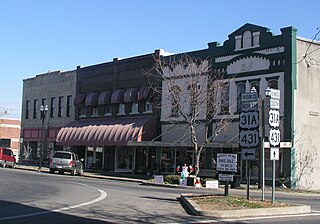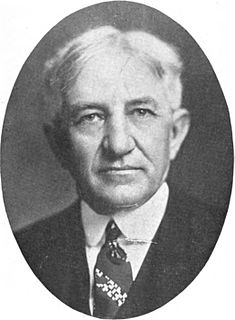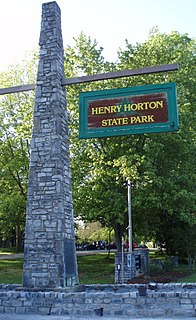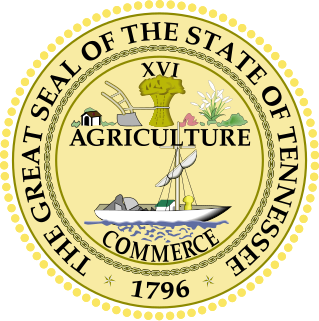
Chapel Hill is a town in northeastern Marshall County, Tennessee, United States. The town was named after Chapel Hill, North Carolina, by settlers from that area. The population was 1,445 as of the 2010 census.

Lewisburg is a city in, and the county seat of Marshall County, Tennessee, United States. The population was 11,100 in 2010. Lewisburg is located in Middle Tennessee, fifty miles south of Nashville and fifty-two miles north of Huntsville, Alabama. Residents have access to the larger cities via nearby I-65.
The Highlander Research and Education Center, formerly known as the Highlander Folk School, is a social justice leadership training school and cultural center in New Market, Tennessee. Founded in 1932 by activist Myles Horton, educator Don West, and Methodist minister James A. Dombrowski, it was originally located in the community of Summerfield in Grundy County, Tennessee, between Monteagle and Tracy City. It was featured in the 1985 documentary film, You Got to Move. Much of the history was documented in the book Or We'll All Hang Separately: The Highlander Idea by Thomas Bledsoe.

Edward Hull "Boss" Crump was an American politician from Memphis, Tennessee. Representing the Democratic Party, he was the dominant force in the city's politics for most of the first half of the 20th century, during which the city had a commission form of government. He also usually dominated Tennessee politics from the 1920s to the 1940s. He was elected and served as mayor of Memphis from 1910 to 1915 and again briefly in 1940. However, he effectively appointed every mayor who was elected from 1915 to 1954.

Harry Hill McAlister was an American politician who served as Democratic Governor of Tennessee from 1933 to 1937. He also served as Nashville's city attorney in the early 1900s, and as Tennessee's state treasurer in the 1920s and early 1930s. Inaugurated as governor at the height of the Great Depression, McAlister enacted massive spending cuts in an attempt to stabilize state finances. He coordinated federal programs in the state aimed at providing Depression-era relief.

Henry Hollis Horton was an American attorney, farmer and politician who served as Governor of Tennessee from 1927 to 1933. He was elevated to the position when Governor Austin Peay died in office, and as Speaker of the Tennessee Senate, he was first in the line of succession. He was subsequently elected to two full terms, then of only two years each.
Matthew Hillsman Taylor, Jr., known professionally as Peter Taylor, was an American novelist, short story writer, and playwright. Born and raised in Tennessee and St. Louis, Missouri, he wrote frequently about the urban South in his stories and novels.

William Emerson Brock was a Democratic United States Senator from Tennessee from 1929 to 1931.

Myles Falls Horton was an American educator, socialist, and co-founder of the Highlander Folk School, famous for its role in the Civil Rights Movement. Horton taught and heavily influenced most of the era's leaders. They included Martin Luther King Jr., Rosa Parks, John Lewis, James Bevel, Bernard Lafayette, Ralph Abernathy, John B. Thompson, and many others.

Nicholas Henry Darnell was an American politician in Tennessee and Texas. He was the only person to serve as Speaker of the House of the Republic of Texas House of Representatives and the State of Texas House of Representatives. He was a member of the Tennessee General Assembly prior to his move to Texas, and during the Civil War raised and led the 18th Texas Cavalry Regiment, which was also known by the name of "Darnell's Regiment."
Zilphia Horton was an American musician, community organizer, educator, Civil Rights activist, and folklorist. She is best known for her work with her husband Myles Horton at the Highlander Folk School where she is generally credited with turning such songs as "We Shall Overcome", "We Shall Not Be Moved," and "This Little Light of Mine" from hymns into protest songs of the Civil Rights Movement.

Henry Horton State Park is a state park located near Chapel Hill, Tennessee, United States. The park was constructed in the 1960s on the estate of the former governor of Tennessee, Henry Horton.
The "Wreck of the Tennessee Gravy Train" is a folk song about politicians and bank failures. It is based on a true incident in Tennessee in 1930. After a scandal involving awarding contracts without bids, Henry Horton was re-elected governor of Tennessee. The Caldwell Company Bank collapsed soon afterward, leaving the state 6 million dollars in debt. An impeachment attempt against Horton was unsuccessful, but he did not run for an additional term. The affair also ruined the career of Senator Luke Lea.

Lambert Estes Gwinn was a Tennessee educator, politician, and attorney. He served as a state senator (1919–1921) and ran for governor in the Democratic primaries in 1922 and 1930. As a prominent criminal and appellate lawyer, he represented many clients before the Tennessee Supreme Court, the United States Circuit Court of Appeals, and the United States Supreme Court.
Conway is a Welsh, Irish & Scottish surname. The name has several origins.
Horton is an Anglo-Saxon surname, deriving from the common English place-name Horton. It derives from Old English horu 'dirt' and tūn 'settlement, farm, estate', presumably meaning 'farm on muddy soil'.
U.S. Bicycle Route 23 is a north-south United States Bicycle Route that travels through Middle Tennessee and the Pennyroyal Plateau of region of Kentucky.

The 1930 Tennessee gubernatorial election was held on November 4, 1930. Incumbent Democrat Henry Hollis Horton defeated Republican nominee C. Arthur Bruce with 63.84% of the vote.

The 1928 Tennessee gubernatorial election was held on November 6, 1928. Incumbent Democrat Henry Hollis Horton defeated Republican nominee Raleigh Hopkins with 61.06% of the vote.










